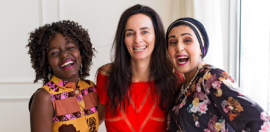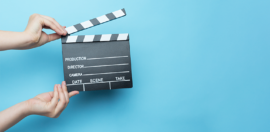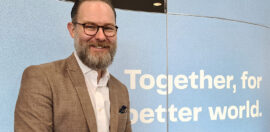In Conversation: Barbara Newhouse

13 March 2018 at 9:09 am
Barbara Newhouse is the senior advisor at the ALS Association, the only national not-for-profit organisation in the US fighting Lou Gehrig’s Disease on every front.
She has more than 35 years of success in leading strategic initiatives resulting in operation growth and market strength.
Newhouse started with The ALS Association in June 2014, just six weeks before the ALS Ice Bucket Challenge became a global phenomenon, raising US $115 million for the association.
During her time at the head of the organisation, she tripled spending on research and doubled the budget of the association, and also initiated the organisation’s efforts to provide a roadmap for the pharmaceutical industry to navigate the drug development and approval process at the FDA.
Newhouse announced in November 2017 she was stepping down from her role as president and CEO of the association to become a senior advisor.
She has been in Australia speaking at the FIA Conference reflecting on how the ALS Ice Bucket Challenge became a global phenomenon and the importance of creating a strategic culture of philanthropy within an organisation.
Here she talks to Pro Bono News about why the success of the Ice Bucket Challenge cannot be replicated, the importance of putting the cause before the organisation and the problem with how transactional our lives have become.
Did you have any idea how successful the ALS Ice Bucket Challenge would be when it launched?
No, absolutely not! First of all, it’s important to know that I started six weeks before the Ice Bucket Challenge occurred. And so I happened to be down in the southern part of the United States in Alabama meeting with a board member I hadn’t met yet. And in talking with him all of a sudden a call comes in and they tell me that there’s this ice bucket thing going on in Boston, Massachusetts and in some parts of New York. I said, “well you know that sounds great. It might raise a few million dollars maybe two or three, maybe $5 million at the most”. Well, we had no idea. We never dreamed that it would take off the way that it did.
What do you think made it a global phenomenon?
That’s actually an easy question to answer. It is the fact that it was so organic and authentic. You know it was started by three young men with ALS, and their use of social media in the circles that surrounded them. It just took off because people saw a face of ALS that fit within the demographic that most highly uses social media.
As you said, it is easy to identify what made it successful, does that mean you would be able to replicate it?
No. I was just having a conversation earlier with someone about replicating it. And the reality is that there are many who have already tried to replicate it, knowing those success factors, and they haven’t been successful. I think that’s where the organic part of it comes in.
It can’t be something that you sit in a marketing room or fundraising room, and attempt to plan for. This was really organic, it came from the roots and so to have people think that they’re going to go and take all of those things and put it all together, and that it’s going to work. So far there’s been those who have attempted it but there has not been that kind of success.
How have you been able to leverage the success you did have and keep the organisation in the limelight beyond the end of campaign?
So it’s important to know that out of the ice bucket we were able to attract 2.5 million new donors. Of those 2.5 million new donors 600,000 of them wanted to maintain regular contact with us. So with the other 1.9 million, I guess it is, what we have just continued to do is we have continued to make our messaging around ALS strong in social media and not make it about [the organisation].
There’s a difference. The difference of are we making this about one organisation or are we making it about the cause. My belief is you make it about the cause. People are going to choose the organisations they want to be involved with but it’s the cause that you want to have the high level of awareness, because that’s what’s going to keep the pressure on the research, it’s going to keep the pressure on the right type of care, it’s going to keep the pressure on the lawmakers around what’s happening within that particular disease space. It’s not about the ALS Association, it’s not about MND Australia or any other organisation that serves ALS, what you want to do to maintain the success of a campaign like the ice bucket is keep the focus on the cause itself.
And I say that because all too often what I think makes something fail is because people become greedy and they keep it about their organisation as opposed to about what the organisation stood for.
What advice would you give charities on building the relationship with their supporters?
I think you have to be able to tell the story. What’s the story that you have to tell? Sometimes it’s we go in and we start with our handout instead of stopping and starting with, “here’s what’s compelling”.
So the other thing is asking people. When you talking to donors and contributors to a cause or an organisation, sometimes we don’t take time to ask the questions to them about what they’re looking for. We are very busy talking about what we have. And so we have to flip it around and ask people what would would make this important to them.
How can organisations create a strategic culture of philanthropy?
For me it’s simple, but to others they may not necessarily see it that way. But to create a culture of fundraising in an organisation beyond fundraisers, you have to first of all make sure that everybody understands in the entire organisation that on some level everybody’s a fundraiser. We have people who specialise in fundraising but if you’re the program person and you’re out there and someone says to you, you’re out in the middle of doing something on the program side whether it’s education or some level of caregiving that you’re working on, and you have someone who asks you about something you have the obligation to tell the story.
You are not, immediately when you’re finished with the story, necessarily the one that’s going to make the ask. But by doing that story you’ve set the stage to come back and say to a fundraiser “here’s what happened with Mrs Smith today, while I was out there and Mrs Smith then started to ask me more questions that I really couldn’t answer around what it meant to leave something in her estate. And so I thought I’d share that information with you”. The fundraiser ought to be then looking at the program person and saying “let’s go back together and have another cup of coffee with Mrs Smith”. So it is all about creating an environment where everyone’s success is interdependent.
What tips can you offer when it comes to storytelling?
Let me back up and say first of all, my first my first degree was in social work. So fundraising I just sort of found out I was good at it. But when I couldn’t remember why I was raising money I would go spend a day on the program side and go with them to do what they did. And so I encouraged, throughout my career I’ve always encouraged, a lot of interaction between and among the program folks and the fundraising folks. And so my tip to fundraisers is take time to remember why you are there trying to raise money. Go find the good stories. I used to in my office put up pictures of people whom we serve, so that I never lost sight of why I was raising money. I could see the picture, I could look at that face and I’d say here is exactly what we did with this person. And this was the difference it made in their lives.
So I think you’ve got to try and find a way because as a fundraiser you can’t have every disease, you can’t have every disability, you can’t have every whatever. You’re not the student at the university, you’re not this, you’re not that, you’ve got to find a way to make it personal.
What do you think are the biggest challenges facing fundraisers at the moment?
I think one of the biggest challenges facing fundraiser’s frankly is social media and how transactional our lives have become. So I think that that’s one thing that’s facing them.
I think another thing that’s facing fundraisers is … I think a lot of organisations find out that someone created a small trainee’s foundation or a small tiny not-for-profit organisation because they were upset with something that another organisation did. So the other thing that we’ve got to start doing is we’ve got to start learning how to bring like organisations together in a room to see where the areas of collaboration can be. So that donors are not feeling like they’re being pulled for the same cause in so many directions. I say that’s one thought. Sometimes it works sometimes it doesn’t.
But the other thing I would say is, and I guess I’m going to tell you the answer by example; I had a lady say to me a year ago in the state of Michigan I had four board members in the room, we were there on a listening tour and she stood up and she said “how do I tell the difference with everything I get in the mail from various different organisations, how do I make my decision on what to give to”. And I said to her right then and there: “I’m going to take my CEO hat off and I’m going to set it on the chair and I’m going to talk to you person to person. You have to decide what’s in your heart, what will give you and bring you the most joy in terms of giving your money. And if that’s not ALS that’s OK. What you also need to do is, if you’re one of those folks that you give based on data, is arm yourself with information. Look at organisations.” And of course I was talking specifically in the health space here. “Look at the organisations that are asking you and find out for yourself, is there any cross work that might be being done behind the scenes, in the area of research for example. Are people with Alzheimer’s who are researching Alzheimer’s doing some things that might impact Parkinson’s disease or impact ALS. And if they are and that’s where your heart is, that’s where your money should go.” Now at the end of that conversation, the rest of the meeting went on and it was an hour or so later and as she walked out the door she walked up and she said “that was one of the most unselfish responses I’ve ever received from a fundraiser” and handed me a check for $100,000.
Sometimes we as fundraisers, at least when I was a line fundraiser, I knew I had my goals I had to make and I had certain increases I had to get to. Well, all those things are fine. But at the end of the day you’ve got to be able to go home and look at yourself, and let me just tell you what I use anyway, I go home and look in the mirror and I say “if my mother were alive today, what would she think about the work I’ve done today?” And so you’ve got to find ways of of letting people know that we only have a number of finite resources and rather than feeling sort of like at times bullying people into giving money, it’s more about how we actually talk about one another. It does no good for me to diss the guy down the street who’s trying to raise money as well. We need to talk about that very positive story.
What can Australia learn from what is happening in the fundraising space in the US?
Let me put it this way, I don’t know that there’s a corner on what Australia could learn from the US because I believe that the US can learn from Australia as well. I think that we together, what we can learn is that we have to recognise that we can learn from one another, that we’re learning together and that there’s no actual perfect system.
I don’t think there’s any country that should be set up above another country when it comes to doing the kind of social impact work that we all do, and that we all want to earn money for. I think we learn from one another. In fact yesterday, [with] the first keynote Tim [Dolan] from the University of Sydney, I got notes that I wrote down that I’m taking back. I sit on a college board back in the States and I’m taking some information back. I think we learn from one another. I think sometimes we allow ourselves to get caught up in the sense of a country based on who’s leading that country’s politics and so along the years somehow the United States has got a bit known as being a bit arrogant. And to me I’m learning as much here in Australia, being here at this conference, as anybody is ever going to learn from me.








I was diagnosed with ALS in May 2008. our doctor put me on riluzole, letting me know there was no cure but the medication might provide me a few more months of delayed symptoms. ALS progresses at different rates and affects different body parts first. me being 62 at the time, fell into a category of what they call “fast progression” (older female). My arms weakened first, then my hands, my mouth, and throat, and finally my lungs. Throughout my two-and-a-half-year ordeal, I was able to walk with assistance until I was told to use totalcureherbsfoundation.com herbal formula which helps me get rid of this ALS totally after using it for just 15 weeks treatment plan. The total cure herbal foundation brought me back to life again and terminate all the symptoms.I have a great doctor and a team of wonderful people working at foundation Most of all, my husband!
My first ALS symptom appeared in 2011. 4 years ago I learnt about ALS/MND successful chinese medicine from Rich Herbs Foundation (ww w. richherbsfoundation.c om), the treatment made a tremendous difference for me. Few weeks into the treatment I had improved muscle strength and coordination, improved speech, improved walking balance, increased appetite, improved eyesight and improved mood swings. 4 years since the treatment, i still feel stronger than ever with no symptoms at all, only occasional tingling on my right foot at night. I feel cured from the disease!
My mother was diagnosed with bulbar ALS in the summer of 2016;Her initial symptoms were quite noticeable. She first experienced weakness in her right arm and her speech and swallowing abilities were profoundly affected. She did little to seek help for this disease, as she had been her brother’s caregiver a few years earlier for the same disease.
She was able to get rid of the ideas with the help of totalcureherbsfoundation.com herbal formula that cured my Parkinson disease ,this herbal treatment helped my entire family during our worst time in life.
My Wife was diagnosed with ALS (Lou Gehrig’s Disease) when she was 72 years old 4 years ago. The Rilutek (riluzole) did very little to help her. The medical team did even less. Her decline was rapid and devastating. Her arms weakened first, then her hands and legs. Last year, a family friend told us about Organic Herbal clinic and their successful ALS TREATMENT, we visited their website www. organicherbalclinic. com and ordered their ALS Formula, i am happy to report the treatment effectively treated and reversed her Amyotrophic Lateral Sclerosis (ALS), most of the symptoms stopped, she is able to walk and eat well, sleep well and exercise regularly., she is pretty active now and her attitude is extremely positive.